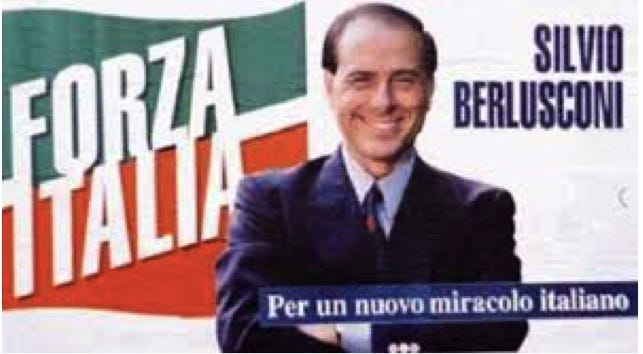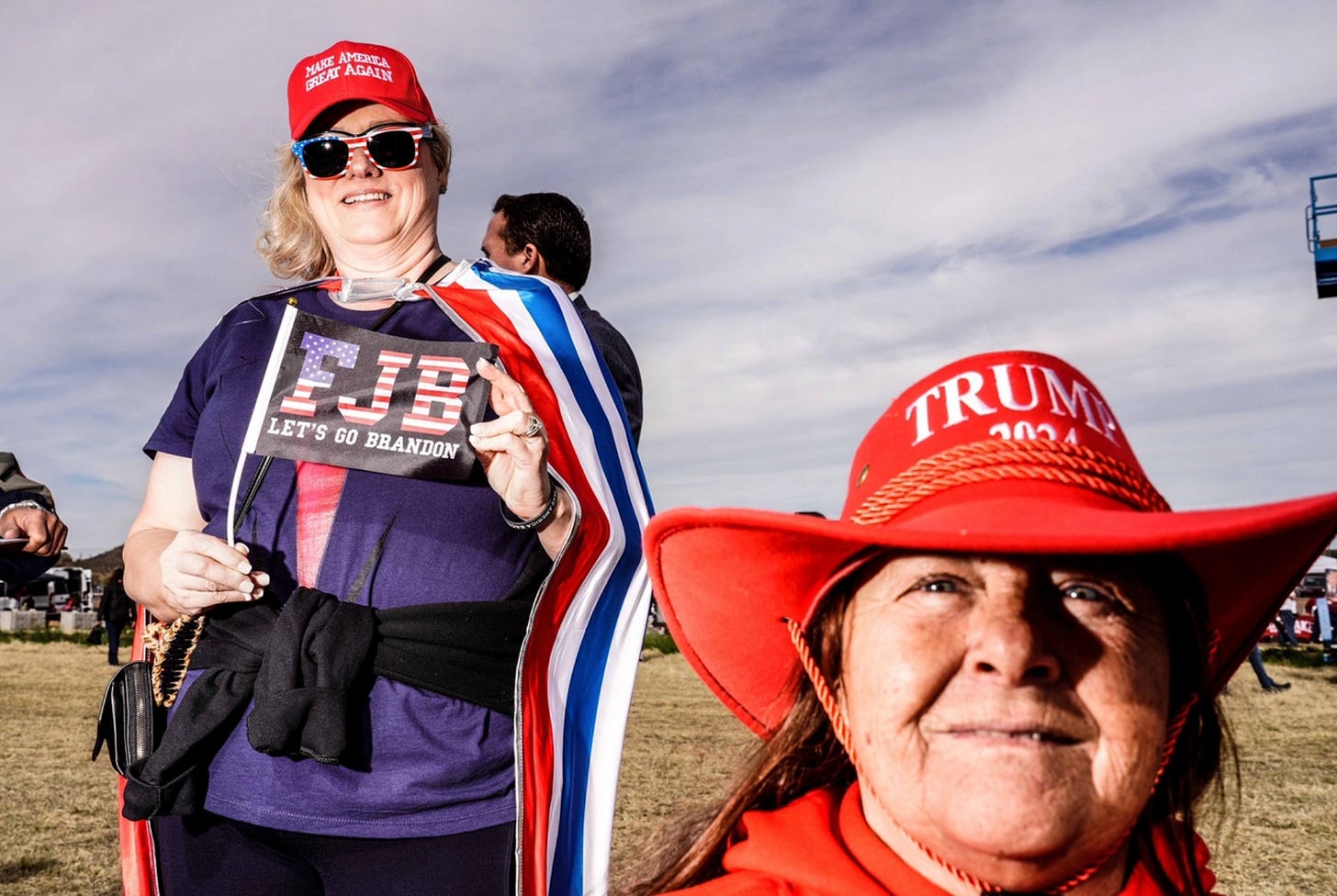Why Do Authoritarians Appeal to People, and Does Trump Study Other Autocrats?
As promised, in this post I will answer some questions posed to me by Lucid subscribers. I prefer to give thorough answers so I can only answer a few at a time. If I do not answer your question today, there will be other occasions: this will be a semi-regular feature to allow members of the Lucid community who cannot attend the Q&As to participate in the flow of information. Future such posts will be paywalled but this is not so that people can judge if this is valuable to them.
You can send your questions to contact.ruthbenghiat@gmail.com.
_______________
Q: Does Trump study what other authoritarians do, or does he just go on instinct?
A: Both. Trump is not exactly a big reader. His first wife Ivana said that Trump had just two books in their bedroom: his Art of the Deal (which was ghostwritten by Tony Schwartz) and a book of Adolf Hitler's speeches. We know from reporting and tell-all books by former officials in his administration that Trump did not read briefings or other materials. Like Mussolini (who was a journalist in his youth) Trump is a superb propagandist and has good instincts in terms of crafting slogans and getting people to bond with him and believe his lies, including the idea that his enemies are threats to the whole nation.
So, Trump did not need to study other authoritarians to know how to behave. However, his speechwriters also give him content that echoes well-known authoritarian themes and language to signal to his extremist followers that he is "one of them." His mentions of "vermin" and blood pollution are in this vein.
That said, authoritarians do learn from each other. They are most interested in what others are getting away with. Hitler idolized Benito Mussolini for getting to power so quickly: his 1923 beer-hall putsch was inspired by Il Duce's 1922 March on Rome. After the Italian Fascists paid a minimal price for their 1935 invasion of Ethiopia, which was a League of Nations member, Hitler felt he could proceed with his imperialist plans. The same can be said today as Xi Jinping observes the fate of Vladimir Putin and his invasion of Ukraine.
In Trump's case, his disinterest in history (or anything outside of money and power) means that his impressions of what other strongmen can do are sometimes based more on fantasy rather than fact. His praise for the supposedly instant executions allowed by the Chinese justice system is one example; his wish that U.S. generals would be as submissive to him as their German counterparts were to Hitler is another (John Kelly, his Chief of Staff and a retired Marine general tried to tell him that some high military officials tried to assassinate Hitler, but Trump did not want to hear it).
If Trump acts in similar ways and has similar desires to other strongmen it's because he has a similar temperament and psychology. In his insecurity, nihilistic destructiveness, opportunism, vanity, paranoia, sadism, inability to hear criticism, and unwillingness to recognize boundaries between public and private (of course he keeps classified government documents at home!) he resembles other authoritarians I have studied.
Q: Why are there so many authoritarians in power today? What are the conditions that lead societies to embrace populist parties and "strongmen" leaders?
From the birth of Communism and Fascism out of the cataclysm of World War One, authoritarian leaders, parties, and systems have flourished in moments of uncertainty and transition. At these moments traditional parties and political systems no longer seem to meet the needs of the moment or have been rejected for revolutionary alternatives. Successful authoritarians often see in the chaos a window for action. Then their lack of any moral code helps them to maneuver into positions that give them the ability to translate their vision into action.
It's telling that many autocrats come from outside the political system (the military, journalism, television, marketing). They are often innovators who create new movements and political arrangements and communicate with their followers in original ways. Business and sports tycoon Silvio Berlusconi's 1994 debut of a now-familiar alliance (conservatives + neofascists) in Italy right after the fall of Communism is an example.
Authoritarians also hold appeal when society is polarized, or divided into opposing ideological camps, which is why they do all they can to exacerbate that process. Progress in gender, class, or racial emancipation has always sparked a backlash, and the strongman becomes the vessel of fears of the loss of male domination, elite privilege, and, in Euro-US contexts, the end of White Christian “civilization.”
Most of all, authoritarians offer people the comfort of enemies. The roster of enemies has not changed too much in a century: immigrants, nomadic peoples, Jews, Muslims, LGBTQ+ people, ethnic minorities, and journalists are among the recurrent targets.
From Mussolini's warnings in the 1920s that white people would be "submerged" by prolific non-white births, authoritarians have used propaganda to create a sense of existential threat: Great Replacement theory, which the Fascists spread and which now circulates among far-right political cultures in Italy, Hungary, and many other countries, is one example.
As the research of Karen Stenner and others has shown, about 30% of people in any given society have authoritarian tendencies. These may be expressed in attitudes about child-rearing, patriarchy, or education. So-called "latent authoritarians" can be engaged and "activated" by a political movement or leader who explicitly appeals to them and who allies with faith and other traditions and sectors of society that foster authoritarian cultures and ways of thinking. Trump was only the latest to do that successfully.
Finally, authoritarians have an appeal when democracy does not seem to deliver solutions and no longer inspires people. That can be because it is seen as too hypocritical (too tied for profit motives to plunderers of the environment, too tolerant of dark money and corruption), too elitist (democratic parties are seen as having lost their connection to rural and working-class populations), or simply not able to provide a sense of community.
As Noreena Hertz and others have shown, democracies allied with neoliberal philosophies and policies have created an epidemic of atomization and loneliness that has consequences at the ballot box (read my Lucid interview with Noreena.here).
Creating community is what authoritarian and populist parties do very well. from the chants, apparel, and rituals that create a sense of belonging, to the emotional manipulation their leaders excel at. Trump tells his followers he loves them, and they feel elevated and cared for by him.
The sad part is that these followers eventually realize that the leader has used them for his benefit. By then the ravages of authoritarianism on society have become evident. "The strongman is at his worst when his people need him the most," I conclude in Strongmen.
So, both of today's questions point to how circumstance and personality can align at historic moments to produce disastrous outcomes. That is what we are living through in the United States with Trumpism now.




scary to think that 30% of any population is a kind of giant "sleeper cell".
Excellent. Thank you for your expertise Ruth.
I have always said Trump is sui generis in American politics. He is an example of the great man theory of history. No other personalty or figure could have transformed a major political party, a media ecosystem, created a leader cult, become President, been twice impeached, attempt a failed coup to stay in power after losing an election and then resurrect himself back into power as the GOP's leading candidate for President four years later based on a very big lie. All while being indicted on 91 counts of fraud and corruption. No one.
This is a testament that Trump is a genius at propaganda and a talented demagogue. He has succeeded in dividing the county and bringing it to the edge of democratic collapse. He is rallying his MAGA base with more extreme rhetoric, mirroring Nazi propaganda and promising to lead us into a neo fascism state if he should ever return to power.